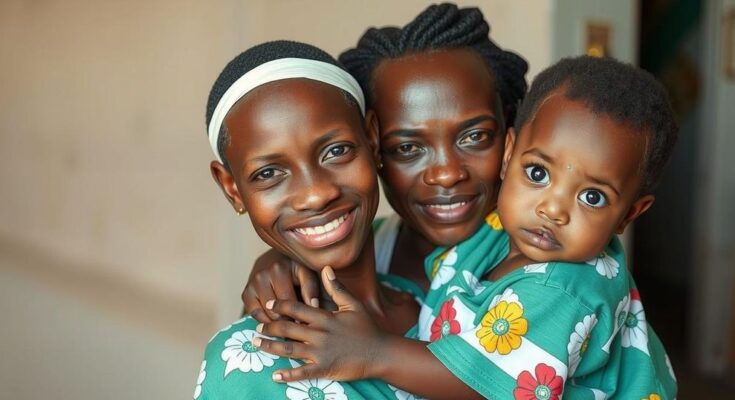This article examines Nigeria’s efforts to reduce maternal and child mortality rates, highlighting success stories and ongoing challenges. It underscores the government’s initiatives, supported by global partners, to enhance health care services, particularly in underserved communities, while acknowledging the need for continued investment and support to sustain these gains.
Hajiya A’ishatu resides in the outskirts of Tudun-Wada city in Gombe State, Nigeria, where she operates a home-based shop. She recalls the care she received during her deliveries at the Tudun Wada Primary Health Care Facility, expressing gratitude for the support from health workers that contributed to her children’s health. Hajiya’s account reflects a broader commitment in Nigeria to enhance maternal and child health services, particularly in underserved areas.
Nigeria faces significant challenges with maternal and child mortality, which ranks among the highest globally, contributing to approximately 20% of the global burden of maternal mortality. In response, the government established a Basic Health Care Provision Fund, which redirected resources to improve primary health care. With technical support and funding from the Global Financing Facility for Women, Children, and Adolescents (GFF), this initiative successfully piloted improved health services in three states and expanded nationwide, strengthening about 900 health facilities with essential infrastructure, including maternity wards and skilled personnel.
Through these programs, essential health services such as free deliveries and pregnancy medications have been provided, and some facilities have covered transportation costs for midwives to assist remote communities. Between 2014 and 2020, prior to the COVID-19 pandemic, the rate of safe deliveries increased dramatically from 22% to 68%, while immunization rates for children tripled, reaching 1 million annually. The focus also extended to adolescent health; adolescents in Kaduna State have benefited from better access to family planning information and nutritional counseling, impacting approximately 12 states in Nigeria and providing nutrition services to nearly 5 million pregnant women.
Despite progress, challenges persist in the health sector. Funding for women’s and children’s health remains insufficient, leading to preventable deaths in areas lacking proper facilities and trained personnel. Zainab Umar Ciroma, the Facility in Charge in Tudun Wada, highlighted ongoing staff shortages as a major concern. Additionally, economic challenges have made health services financially burdensome, prompting many women to avoid medical facilities in favor of home births or traditional healers. Sumaiya Yakubu, a local patient, noted that prior incentives for hospital births are no longer available, leaving many women to seek free home births instead.
In light of these challenges, Nigeria is taking substantial steps to prioritize the well-being of women and children, guided by a collaborative approach with its development partners. The government launched the Nigeria Health Sector Renewal Investment Initiative, aiming to dramatically reduce maternal and child mortality rates. This initiative fosters alignment among partners regarding national health priorities, particularly in a resource-constrained climate. Recently sanctioned financing of $570 million from the World Bank, in collaboration with other entities, aims to fill vital funding gaps to ensure the provision of primary health care services and family planning resources to vulnerable communities. As Nigeria navigates this critical phase, its commitment to strategic investment and collaboration stands as a beacon of hope for enhancing healthcare delivery, potentially saving countless lives across the nation.
The article discusses the concerted efforts made within Nigeria to combat maternal and child mortality, which ranks critically high on a global scale. It highlights individual experiences like that of Hajiya A’ishatu while emphasizing a national response through government initiatives funded by international partners, aiming to enhance health services in underserved communities. The narrative outlines both achievements and ongoing challenges in the health sector, indicating a continued commitment to improving healthcare delivery for women and children.
In conclusion, Nigeria is making significant strides in addressing maternal and child health challenges through government initiatives and international collaboration. The establishment of health programs has led to improved access to services, increased safe deliveries, and better health for adolescents. Though challenges such as funding inadequacies and staff shortages persist, ongoing commitments to strategic investments and partnerships present a promising path forward for enhancing health outcomes for women and children in Nigeria.
Original Source: www.worldbank.org




